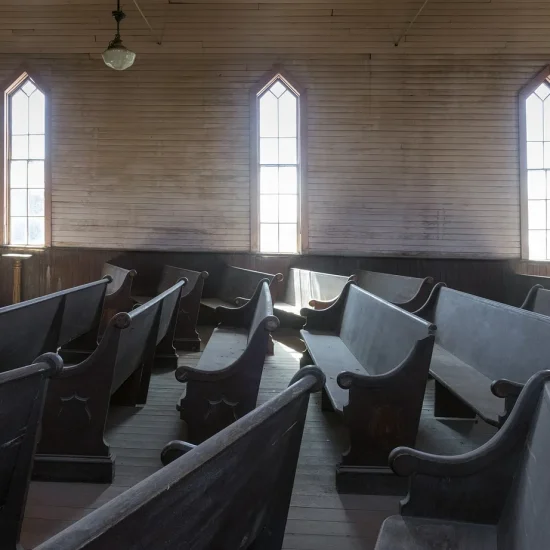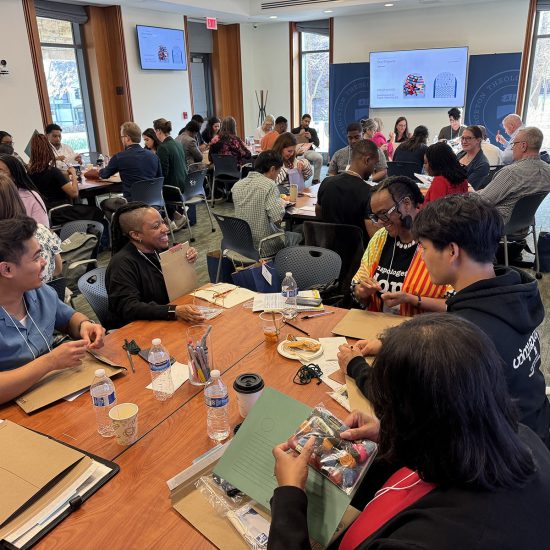Bivocational ministers live in two worlds — in part to support themselves and their families economically but also, at least for some, as a way to translate the world to the church and the church to the world.
Individuals become bivocational pastors for a number of reasons and each ministry carries a different complexion. But ministers with two or more jobs share some common bonds. Five pastors from around the Midwest share their specific experience.

Melissa Newberry (in front) poses with church members during a fellowship outing. Love for the church family helps keep the pastor of Grandview Baptist Church in Kansas City, Kan., committed to a bivocational lifestyle. (Grandview Baptist Church photo)
|
Mike Justice and Rick Neubauer felt called to the ministry later in life and were unsure how that call would play out for them.
Justice, pastor of First Baptist Church in Milton, Kan., said he ignored God’s prompting. As a divorced man, he felt unqualified to respond. But the pastor at First Baptist Church in Clearwater, Kan., where Justice was a member, told him to “let God decide who’s qualified.”
A schoolteacher when called, he earned a master’s degree in Christian ministry from Friends University in 2001 by taking evening classes. The church called him as pastor in 2002. “I thought the call was more to evangelism,” Justice said. “I had no intention of being a pastor.”
Called as a 40-year-old, Neubauer’s first position was bivocational as pastor of a small Hispanic mission church in Wichita, Kan. “My first bivocational ministry gave me an opportunity to ‘get my feet wet’ in ministry. It was a great learning experience for me as a new pastor who hadn’t set out to be in the ministry,” he said.
Four years later, he was called to a full-time pastorate. Now he and his wife have chosen to return to bivocational ministry, primarily for family reasons — to help care for parents and a daughter with health issues and to be near their four grandchildren. They serve Slate Valley Baptist Church in Geuda Springs, Kan.
“My second bivocational ministry has given me the opportunity to work with a group of people that are grateful to have a pastor and want to continue to do ministry together while meeting our need to be close to home,” he explained.
“Honestly, I think in all reality, bivocational ministry chose me,” said Melissa Newberry, pastor of Grandview Baptist Church in Kansas City, Kan. Numbers had dwindled to the point that the congregation had to consider calling a part-time pastor.
She believes God “was already at work” preparing the congregation and her. She was able to retain her secular employment with two physicians. “In retrospect, it is very evident to see God’s orchestration of the situation and how God had prepared both pastor and congregation for this transition,” she said.
Dylon Young sort of grew into his position. Working a “regular job” while serving as an associate pastor with another church, he was asked to be the interim pastor at Miracle Hills Community Baptist Church in Omaha, Neb. Young took up the post while the church’s pastor search committee sought a new leader. Instead, eight months later, they asked him to stay on.
Juggling two vocations requires flexibility and understanding — from the congregation, the other employer and the pastor’s family — the ministers agreed. Balancing time is the most common concern and sometimes the most difficult to handle.
A retired schoolteacher, Justice still teaches high school half-time. Although he admits he sometimes doesn’t balance his two positions very well, “I feel very blessed to participate in the two greatest vocations a man can have,” he said.
He also gave up some school and community activities he treasured — coaching sports and serving on the city council and as mayor — to respond to God’s call.
The high school principal and the system’s superintendent have been “very supportive,” Justice said, and allow him to use sick leave and personal time for ministry.
Neubauer is an instructor at Butler Community College, where he works eight months of the year, has summers free and has time off for Christmas and Easter. His immediate supervisor also is a bivocational pastor. The dean is a believer, as well, and was dean when Neubauer served his first bivocational church and worked at the school.
The doctors for whom Newberry works are believers, which makes juggling two positions “much easier and very supportive,” she said.
And congregants are learning to take on responsibilities as they transition from having a full-time pastor. “I am very blessed to be serving this church as they are very self-sufficient people,” Newberry said. “They are the type of congregation that understands if ministry is to happen, God is calling them to do it and their response is intentional…. I would say that our relationship is more of coming alongside than directing traffic.”
Young admits he has had to work at it a little harder to balance his two positions. “Perhaps the biggest adjustment for me was learning to prioritize my home life and church life,” he said. “Particularly in church, I had to learn to focus on the most important tasks for me as a pastor and address the other pastoral issues as time permits.
His members, too, have stepped up to be more involved in church activities and to handle some duties. “[W]ith my civilian job, I think the members are more understanding and willing to assist me in some respects,” he said.
But one small-town Missouri pastor, who wishes to remain anonymous, wants church members to understand how difficult bivocational ministry can be for some. Although he had a job when he moved to the field, it “fell apart” and he has not been able to find another.
Most of his former work experience has involved weekends, but his church responsibilities now limit that option. “The reality is that I may have to leave this church simply because I can’t find work in this town,” he said.
All the pastors acknowledged some challenge they face as bivocational ministers. Young said outside employment limits his time to interact with the community. “I would love the chance to be able to leave my church office during the day and get a chance to talk with folks living and working in the community,” he explained.
Time “without a doubt” is also the challenge for Justice. He and his wife spend “a lot of time in prayer and talking” about priorities. “We knew I can’t treat it as a part-time job,” he said.
Because he had been a full-time pastor, Neubauer has found it difficult to adjust to more limited engagement with his current congregation and “not having the flexibility to respond to ministry opportunities as needed due to ‘tent-making’ responsibilities,” he noted.
While trying to fulfill responsibilities for two jobs can be frustrating, all the pastors praised the benefit of serving bivocationally.
Neubauer points to time outside the church walls as a benefit, even though he is frustrated, too, by the limited interaction with members. While a full-time minister, he was “surrounded by church people” and spent a majority of his ministry with programming, visiting members and actively participating in the American Baptist Churches, USA, Central Region.
“I found that my time making contact or developing relationships with unbelievers was more difficult. Now that I am back in bivocational ministry, I spend as much time in the mission field as I do with my church family and church-related duties. That is the biggest benefit in terms of kingdom work being done,” he said.
Young sees pastoral freedom, particularly for responding to social justice issues, as the greatest benefit for him. He believes the church must remain the “moral compass” in the midst of societal and cultural change.
“My concern is that many pastors may feel pressured to remain silent on some of the ‘hot-bed’ social issues taking place because they may feel that by speaking, they are placing their job in jeopardy,” he explained. “A bivocational pastor may not feel that much pressure because their livelihood is not necessarily at stake.”
For Newberry, the mutual love between pastor and congregants has been especially meaningful. Just being the pastor has been one of the “greatest and meaningful benefits,” she said.
“How deeply I care for them, how deeply they care for me and each other makes my pastorate a true delight…. The love I have for each of them has grown and continues to grow with each experience shared and time spent together. They and this pastorate are a true blessing.”






